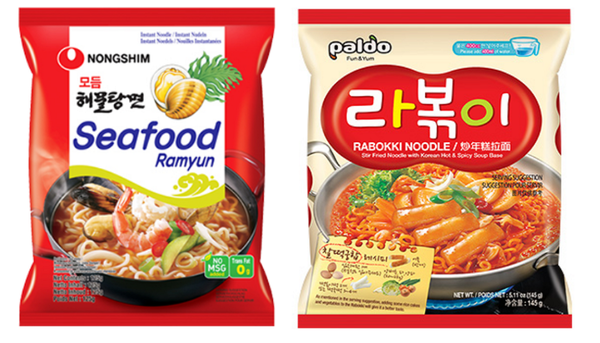The Ministry of Food and Drug Safety said it has found 2-chloroethanol (2-CE) in some packets and raw ingredients of two Korean instant noodle brands exported to Europe, which were insufficient to cause any harm.
The ministry added that ethylene oxide (EO), a carcinogen, was not detected in the two instant noodle products.

The products examined were Nongshim’s Seafood Ramyun made at the company’s plant in Busan, and Paldo’s Rabokki, a combination of noodle and Korean rice cake, for the North American market produced at a plant in Icheon, Gyeonggi Province.
Last Friday, the ministry said it had received a report that 2-CE was found in the instant noodles exported to Europe, conducted an on-site investigation into the manufacturing facility, and tested related products since Aug. 9.
Concerning Nongshim’s products, there were no manufactured packets left at the plant. Hence, regulators had to inspect wheat flour, six ingredients for vegetable mix, and the soup powder.
About 0.11 milligram of 2-CE was found in green chives per kilogram and 2.2 milligrams per kilogram in the vegetable mix of Nongshim’s finished products for domestic supply. In Paldo’s instant noodle, 12.1 milligrams of 2-CE was found in dried powder per kilogram.
EO is classified as a class-one carcinogen in the U.S. and Canada and used as a fumigant or disinfectant in the agricultural field due to its toxicity. On the other hand, 2-CE is not a carcinogen as it can be created as intermediates of EO or unintentionally contaminated through the environment.
The ministry said it obtained information that 2-CE was detected in instant noodles shipped out to Europe and examined the relevant products and manufacturing facilities.
The ministry collected relevant products for prompt safety management after discovering that 2-CE was found in Nongshim’s Seafood Ramyun.
Although the manufacturing process for export and domestic use is the same, there are some differences in the composition of raw materials for noodles, powdered soup, and vegetable mix (liquid soup) for the nation and overseas.
The regulator plans to review the provisional standards after securing sufficient data on 2-CE contamination levels and the causes.
“For the two products, we plan to investigate the causes by inspecting about 18 ingredients and take measures to identify and improve the contamination route,” a ministry official said. “Also, we will require Nongshim and Paldo to receive an inspection from an officially authorized inspection agency for EO and 2-CE on the instant noodle products in question and require them to submit the results.”
The official added that the ministry would continue to monitor safety information on famous food products and ensure that only safe foods are sold.

